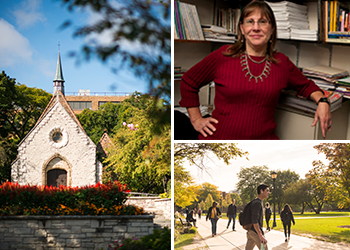Social Welfare and Justice Electives
Social welfare and justice electives (Go to Class Search for specific course offerings during each semester and prerequisites):
SOWJ 2150. Immigrants and their Communities
An in-depth examination of historic and contemporary immigration to the U.S., especially in relationship to the American economy, ideas about race and cultural pluralism. The effects of immigration law and social policies on the socio-economic mobility and well-being of immigrant families are examined.
SOWJ 2300. Conflict Resolution and Restorative Justice
Introduction to Alternative Dispute Resolution (ADR) as an interdisciplinary field developed to resolve conflict, improve communication and promote reconciliation. Theory and practice of engaging in difficult conversations, mediating interpersonal conflict and conducting restorative justice circles through active learning assignments. Direct application of examples from court affiliated programs. Limits and potential of forgiveness.
SOWJ 2600. Community Organizing
Teaches basic leadership and organizing skills. Designed to be interactive and experiential, with role-plays, case studies and self-evaluations.
SOWJ 3170. Policy and Practice for Children Impacted by Incarceration
Increase understanding of the experiences and issues faced by children with incarcerated parents focusing on the racial, ethnic and socioeconomically disadvantaged and disenfranchised populations. Evaluate appropriate evidence-based practices, strategies, and policies. Identify and evaluate evidence-based practices and policies that positively impact children with incarcerated parents. Develop legislative and advocacy strategies to promote these practices and policy change. Emphasis on collaborative learning.
SOWJ 3320. Victim Services and Policies
Explores the history of victim services, the effects of victimization on individuals, families, and communities, the development of policies and the services available to victims within and external to the criminal justice system. Specialized topics may include family violence, workplace violence, public tragedy, violent crime, and white collar crime.
SOWJ 3370. Family Practice
Introduction to family practice, primarily examining communication and structural models. Various theories of family intervention. Exploration of the process from initial problem assessment through intervention planning, implementation, evaluation, and termination. Simulations, role play and other classroom exercises help students understand how theories and techniques are applied in practice.
SOWJ 3400. Advocacy and Social Change Theory and Practice
Review various theoretical and historical perspectives on injustice and oppression, within the context of social change strategies. Examination of traditional and nontraditional social action strategies, including community organizing/development. Learn agency and legislative advocacy skills with a specific focus on victim advocacy and at-risk populations. Analyze values and ethical perspectives related to social change.
SOWJ 3450. Arabs and Muslims in Global Context
Explores the social, economic and political conditions of Arabs and Muslims living in diaspora through four analytic lenses: race, gender, national security and Islamophobia. Subject matter is grounded within globalizaiton trends.
SOWJ 3700. Social Welfare and the Law
Provides an overview of issues lying at the intersection of the social work and the legal professions. Principles of collaboration between these professions and selected concepts and principles related to the establishment and enforcement of legal and social provisions for the protection of children, adults and the family are emphasized. Presents theoretical knowledge and background material, with opportunities to critically analyze social welfare and legal issues.
SOWJ 4300. Advanced Practice
Students strengthen their skills in interviewing, data collection, problem appraisal, and the development of contracts for planned change. Competence is developed in carrying out contract plans, evaluating results, renegotiating contracts and terminating contracts. Working with families and groups is further examined.
SOWJ 4500. Challenges in Social Welfare and Justice
An in-depth examination of ethical issues and special challenges that characterize the fields of social work, social welfare and social justice. Explores value dilemmas, stresses and frustrations that may confront professionals in these fields.
SOWJ 4600. Faith-based Activism
Analyzes sociologically a range of historic and contemporary faith-based movements through the lens of social movement theory. Examines variations in goals, framing, strategies, mobilization, engagement of symbols and movement cultures as they are recorded in movement literature, oral histories, archives, films and scholarly studies.
SOWJ 4700. Global Aid and Humanitarianism
Critical examination of intervention claims to "do good" through governmental, nongovernmental, and volunteer efforts in global aid and humanitarianism. Explores ethical and practical dilemmas in solving internationally identified social problems, such as child soldiers, sex trafficking, and global hunger. Examines how aid and humanitarian systems can be part of the problem rather than the solution, and tensions between human rights-based approaches and cultural humility. Addressses cross-cultural and power dynamics of professional and volunteer work.
SOWJ 4931. Topics in Social Welfare and Justice
A lecture course on special areas and themes. Specific topics will be designated in the Schedule of Classes.
SOWJ 4986. Advanced Internship in Social Welfare and Justice
Continuation of the internship experience. Placement is for a minimum of 140 hours per semester of supervised practice at the same agency as the previous semester and includes a weekly seminar. S/U grade assessment. Limited enrollment.
SOWJ 4995. Independent Study in Social Welfare and Justice
Supervised study in a specific area of SOWJ, such as in-depth library of field research, or a focused community project.
SOWJ 4999. Senior Thesis
SOWJ majors with a quality point average of 3.000 or higher may write a thesis under the direction of an adviser.
Additional Information




